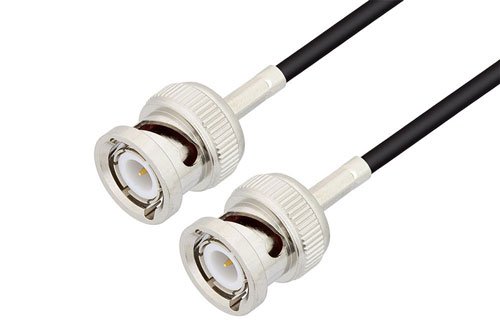
BNC to coax cable
The BNC to coax cable connection is a trusted and widely used solution for transmitting video and data signals across various industries. From security systems to broadcasting, this connection type ensures high-quality signal transfer with minimal interference. In this blog post, we will explore the importance of the BNC to coax cable, its applications, and the advantages it offers for both professional and consumer use.
What is a BNC Coax Cable?
This type of coax cable involves pairing a Bayonet Neill–Concelman (BNC) connector with a coaxial cable to transmit signals. The BNC connector is a quick-locking connector that provides a secure connection with a simple twist-and-lock mechanism. The coaxial cable, often referred to simply as “coax,” consists of a center conductor, insulating layer, shield, and outer jacket, which protect the signal from external interference. When combined, this connection becomes a robust option for transmitting video, radio frequency (RF), and data signals across various systems.
Applications of a Coax Cable with BNC Connectors
One of the most common uses of a BNC coax cable is in CCTV (closed-circuit television) and security camera systems. Security professionals rely on this setup to transmit high-quality video footage from cameras to monitors or recording devices. The BNC connector’s secure connection ensures that signals remain stable, making it ideal for real-time surveillance.
Beyond security, broadcasting is another field that makes extensive use of BNC to coax cables. The cable provides a stable transmission of video signals from cameras to control rooms, ensuring that live broadcasts maintain their quality without signal loss or degradation.
In the field of radio communications, BNC connectors are frequently used in RF applications, where precision and low loss are critical. The coaxial cable ensures minimal signal degradation, while the BNC connector provides a stable connection for antennas, radios, and other communication equipment.
Advantages of Using a BNC Coaxial Cable
This type of cable offers several key advantages, making it a popular choice for transmitting data and video signals.
1. High Signal Integrity: One of the main benefits of using a BNC to coax cable is its ability to maintain high signal integrity. The coaxial cable’s design ensures minimal signal loss, even over long distances, while the BNC connector provides a secure connection that prevents accidental disconnections or signal dropouts.
2. Versatility: The coax cable with BNC connectors is compatible with a wide range of systems and devices. It’s used in security setups, broadcasting, medical imaging, and telecommunications. This versatility makes it a go-to solution for professionals across different industries.
3. Durability: Coaxial cables are built to withstand harsh environments, and when paired with a BNC connector, they provide a durable and long-lasting solution. The BNC connector’s locking mechanism ensures a stable connection, even in settings where cables may be subject to movement or vibrations.
4. Ease of Installation: Another key advantage of this cable type is its easy installation. The twist-and-lock mechanism of the BNC connector allows users to quickly connect and disconnect devices without needing specialized tools or technical expertise.
Conclusion
The BNC to coax cable remains a reliable and efficient solution for transmitting video, RF, and data signals in various industries. From CCTV systems to broadcast and RF communications, this cable connection ensures high-quality signal transfer with minimal interference. Its durability, versatility, and ease of use make it a preferred choice for both professional and consumer applications.
For more information or to find the right BNC to coax cable for your project, explore our extensive selection at Infinite Electronics. Whether you’re upgrading a security system or setting up a broadcast studio, we have the cables and connectors to meet your needs.




 Pasternack Blog
Pasternack Blog
